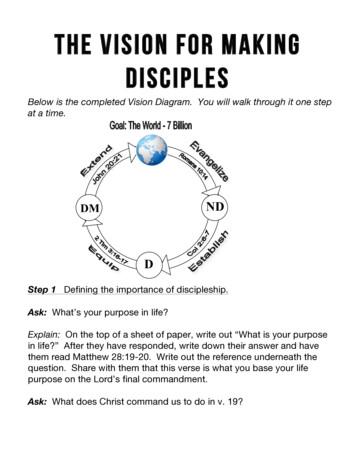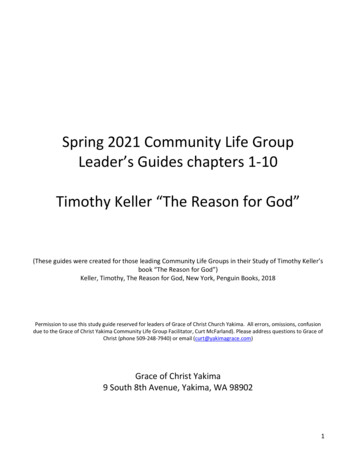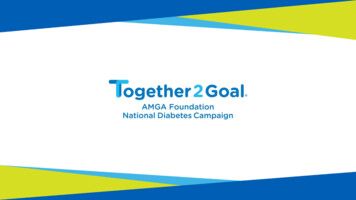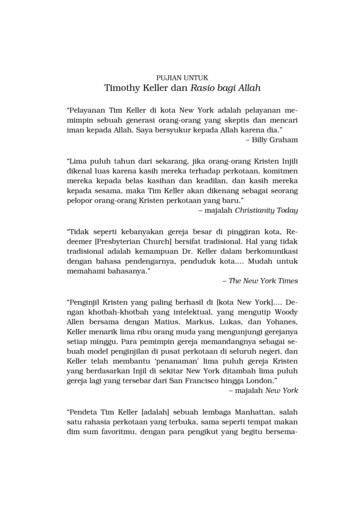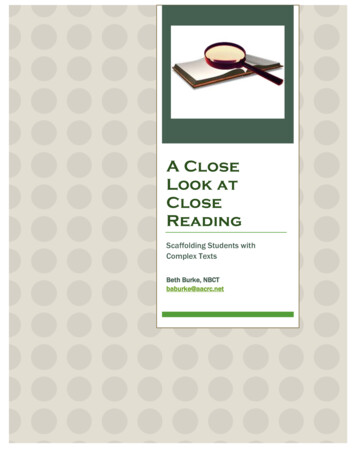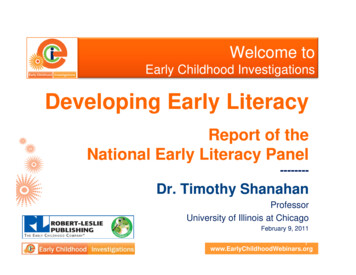
Transcription
Welcome toEarly Childhood InvestigationsDeveloping Early LiteracyReport of theNational Early Literacy Panel--------Dr.Dr Timothy ShanahanProfessorUniversity of Illinois at ChicagoFebruary 9, 20111www.EarlyChildhoodWebinars.org
FAQsThe session is recorded.Slides will be available.Twitter: #ECI11Survey, please!Door prizes!www.EarlyChildhoodWebinars.org2
The GoToWebinar Attendee ViewTechnical Support: 888-259- 8414www.EarlyChildhoodWebinars.org
*www.EarlyChildhoodWebinars.org4
Sponsoredbyy Robert-Leslie PublishingpgJudith hildhoodWebinars.org5
Today’sy PresenterDr. Timothy ShanahanProfessory of Illinois,, ChicagogUniversitywww.EarlyChildhoodWebinars.org6
Developing Early LiteracyReport of theNational Early Literacy Panel
C di t d bCoordinatedby: National Center for Family Literacy (NCFL)Funded by: National Institute for Literacy (NIFL)In consultation with: National Institute for Child Health and HumanDevelopment (NICHD) U.S. Department of Education Head Start Bureau, Department of Health andHHumanSServicesi
Panel MembersDr. ADAnne CCunningham,i hUUniversityiit off CCalifornialif i att BBerkeleyk lDr. Kathy Escamilla, University of Colorado at BoulderDr. Janet Fischel,, State Universityy of New York at StonyyBrookDr. Susan H. Landry, University of Texas—HoustonDr Christopher JJ. LoniganDr.Lonigan, Florida State UniversityDr. Victoria Molfese, University of LouisvilleDr. Chris Schatschneider,, Florida State UniversityyDr. Timothy Shanahan (Chair), University of Illinois atChicagoDr Dorothy StricklandDr.Strickland, Rutgers University
Background Increase the use of research ineducationaldtilddecisioni i makingki Limits of the Report of the NationalReading Panel Need for comparable information onearly literacy and family literacy
Questions Addressed by theResearch Synthesis
Research Questions What helps children to develop the skillsand abilities that are linked to thechildren’schildrens development readingreading, writingand spelling? What contexts facilitate or inhibit theeffectiveness of these efforts? With whomhdod ththese effortsff t workk best?b t?
Research QuestionsTo answer those questions, it is necessary tod fi or iddefineidentifytif ththe appropriatei t outcometmeasures. What skills and abilities are linked to lateroutcomes in reading, writing and spelling?
Emergent LiteracyWhat skills constitute the domain ofconventional literacy skills? DecodingOral reading fluencyReading ComprehensionSpellingWriting
How to Define Emergent LiteracyTTwo conditionsdi irequiredi d forf somethinghi to bebconsidered an emergent literacy skill: MustM come beforeb fconventionalilliteracy skills. MustM beb relatedl d to conventionalilliteracy skills.
Identifying Emergent Literacy SkillsSome suggestions: oral languageconcepts about printenvironmental printalphabet knowledgephonological processing skillsvisual‐perceptual skillsemergent (pretend) readingemergent (pretend) writing
Identifying the Studies for RQ1 7300 publications were screened against initialcriteria– Published in English– Published in a refereed journal– Empirical research– Include children between the ages of 0 and 5 orkindergarten children
This screening resulted in the identification of: 299 studies identified that involved apredictive relation between a preschool or Kskill and a later-measuredlater measured conventionalliteracy outcome (decoding, readingcomprehension spelling)comprehension,spelling).
DecodingPredictorAverage rN of studiesN of childrenDecoding nonwords.72728763Spelling.6071,184Invented spelling.5810778Reading NOS.5731,739Decoding NOS.535877Decoding words.52214,121Reading comprehension.525700ABC knowledge.50527,570Readiness.505051 9881,988Writing/writing ological awareness.40698,443
Decoding (cont).(cont)PredictorAverage rN of studiesN of childrenRAN letters/digits.4040122 0812,081Concepts about print.34122,604Oral language.33639,358RAN objects/colors.32163,100Phonological NOS.313174Performance IQ.30152.792Print awareness.296683Environmental print.2861,042Phonological STM.2626334 8634,863Visual motor.25141,316Visual memory.2281,708Visual perception.22162,551
ComprehensionPredictorAverage rN of studiesN of childrenReadiness.59593348Concepts about print.543535ABC knowledge.48172,038Print awareness.484347Phonological awareness.44202,461RAN letters/digits.433333RAN objects/colors.4261,146Decoding nonwords.413282Decoding words.404061 0911,091Phonological STM.39131,911Arithmetic.3581,197Performance IQ.345253
Comprehension (cont).(cont)PredictorAverage rN of studiesN of childrenOral language.3333304 0154,015Writing/writing name.334565Visual perception.2691,438Visual motor.2291,333Concept knowledge.203873Visual memory.175875
Criteria for MetaMeta--Analyses Meta-analysis requires a minimum of three studiescontributing an effect size to allow interpretationinterpretation. Additionally, we designated correlations in thefollowing manner:Strong relationships:.50 or greaterModerate relationships: .3030 - .5050Weak relationships:.00 - .30
Identifying Emergent Literacy Skills A numberb off variablesi bl hhave moderated t ttostrong relations with later conventionallitliteracyoutcomestiin a relativelyl ti l llargenumber of studies with a relatively largenumberb off childrenhild((meaningi ththey aresizable, reliable, and stable):
Strong to Moderate Predictors: Alphabet KnowledgeConcepts About PrintPhonological AwarenessOral Languageg Name/WritinggWritingRAN (Rapid Automatic Naming/LexicalAccess)
Identifying Emergent Literacy SkillsOther variablesOthi bl hhave smallerll effectsff t or hhavenot been studied often or with manychildren: Visual Motor SkillsVisual MemoryVisual Perceptual SkillsEnvironmental Print
Identifyingy g EmergentgLiteracyy Skills Variables not in the table have not yet beendemonstrated to be predictive ofy skills.conventional literacy An important caution: these findings arey on zero-order correlations.based only– Correlations may reflect third variables.– Variables may share predictive variance.
Identifying Emergent Literacy Skills Greater confidence of the importance of avariable would be obtained if that variablecontributed unique predictive variance to anoutcometonce otherth importantit t variablesi bl werecontrolled. For example, does a variable predict a readingoutcome above and beyond variance sharedwithith IQ or languagelskill?kill?
Identifying Emergent Literacy SkillsExamination of multivariate studiesd cates thatt at severalse e a ofo theset eseindicatespredictors provide independentpredictiveped c e informationo a o eevene whenemeasured within the context of othervariables.
Unique predictors from the multivariate studies: Alphabet KnowledgePhonological AwarenessRapid Automatic NamingWriting/Writing NamePhonological STM
Summary of Correlational AnalysesPredictor variateSignificancegAlphabet Knowledge YesPhonological Awareness YesConcepts About Print SometimesRAN Letters/Digits NAYesRAN Objects/Colors YesWriting/Writing Name YesOral Language SometimesPhonological STM-- YesVisual Perceptual---- NoPrint Awareness-- NANA
Additional Analyses Do variables have stronger or weaker predictiverelations depending on when they were measured(Pre‐K vs. K)? Do variations in the aspect of oral language measuredmake a difference (e.g., vocabulary vs. grammar)? Do variations in the aspect of phonological awarenessmeasured make a difference (e.g., syllables vs.phonemes)?
Does Age at Assessment Matter? FFor ththe mostt part,t age att assessmentt did nott matter.tt Skills that were important predictors of laterconventional literacy skills were important whetherassessed in preschool or in kindergarten. When differences were found,found they typically indicateda stronger relation for the earlier (preschool)assessment.
Does oral language definition matter? WhWhatt partst off orall languagelare examinedi dmatters a lot. Vocabulary is a weak predictor of later decodingand comprehension. More complex aspects of oral language,language likegrammar and definitional vocabulary, are verystrongg ppredictors of decodingg andcomprehension.
Oral Language PredictorsAverage Predictive CorrelationPredictor VariableDecodingComprehensionLanguage Composite.5858.7070Decoding CompReceptive Language.52.63Decoding CompExpressive Language.48.59Decoding CompGGrammar.4747.6464DDecodingdi CCompDefinitional Vocabulary.38.45Decoding CompVerbal Knowledge.36.45Decoding CompVerbal-IQ.35.35Decoding CompReceptive Vocabulary.34.25Decoding CompListening Com prehension.33.43Decoding CompVocabulary NOS.33.31Decoding CompExpressive Vocabulary.24.34Decoding CompLanguage NOS.20.31Decoding Comp
Do the typesyp of PA differ? Early forms of phonological awarenessare strong predictors of later readingskills.skills Measures of rhyme are not the besti di tindicatorsoff hhow wellll childrenhildareacquiring phonological awareness. Development moves from larger units tosmaller units of sound.
What works?Determiningg causal relationships:p Cause must precede the effect Cause must be related to the effect We can find no other plausiblealternativeltti explanationlti forf theth effectff tother than the cause.
Cause and Effect Research studies vary in their ability toaddress cause and effect relationships Studies can be placed in a generalhierarchy according to how much causalinformation they can provide ExperimentsQuasi-experimentsCorrelational studiesCase studies
Cause and Effect Research studies vary in their ability toaddress cause and effect relationships Studies can be placed in a generalhierarchy according to how much causalinformation they can provide ExperimentsQuasi-experimentsCorrelational studiesCCasestudiest di
Reviewinge eg Researchesea c oon WhatatWorks Redid original search to include studies that hadoutcomes identified in first part of study (orallanguage, alphabet knowledge, PA, etc.) Over 900 articles were retrieved and reviewedby panelists. 138 articles were categorized by interventiontype.
Category 1: Helping Children MakeSense of Print--CrackingPrint Cracking the AlphabeticCode and Teaching Letters and Words(PA, Letter Knowledge, Spelling,Phonics, Print Awareness, VisualPerceptual/Perceptual Motor) (67articles)
Category 2: Reading to and SharingBooks with Young Children (16articles) Category 3: Parent and HomePrograms for Improving YoungChildren’s Literacy (20 articles)
Category 4: Preschool and KindergartenPrograms (16 articles) Category 5: Language EnhancementStudies (19 articles)
Code‐FocusedCodeFocused Interventions All of this work was done individually or insmall group PA training included analysis or synthesis ofwords, syllables, onset‐rimes, phonemes (withfeedback) Age/developmental level made no differencein the benefits of this kind of teaching, butwhat was taught varied (larger to smallerunits)
Code‐FocusedCodeFocused Interventions No studies on alphabet learning alonealone, butwhen ABCs and working with print werecombined with PA it seemed to be morebeneficial
Code‐FocusedCodeFocused Interventions Moderate to large effects on early literacyskills and conventional literacy skills Most the studies examined some form ofphonological awareness training ThereThwas no pointi alongltheh llearningicontinuum that code‐focused learning wasn’timportant
Category 1 Effects for Subset of Outcome ConstructsEffect Sizes for Outcome Variable and (n) of StudiesContributing to Effect SizeType of TrainingPhonological AlphabetAwareness KnowledgeOralLanguageReadingSpellingPA Trainingg OOnlyy.91***(21).04(6).09(4).19(10).59**(4)PA & 66***(17).59***(8)AK Training OnlyPA & PhonicsTraining.74***(19)
Reading to Children Moderate effects on oral language skills andprint knowledge Oral language effects were evident acrossdemographic groups, types of interventions,and student risk factors Almost no studies looked at the impact ofreadingdi to childrenhildon readingdi or on otherhemergent literacy skills
Reading to Children Biggest impact were derived from dialogicreading as opposed to just reading Biggest payoff on the simplest measures oforal language GivenGitheh lackl k off evidenceidon otherh literacylioutcomes, it would be imprudent to makereadingdi to childrenhilda program ini andd off itselfi lf
Oral Language Effects for Dialogic ReadingType of ReadingMeanES 95%CI -95%CIpNDialogic Reading.59.980.20.019Not Dialogic Reading.41.87-0.06.116
Home and Parent Programs Parent programs had moderate to large effectson oral language outcomes and generalcognitive abilities Included programs with general goals (health,cognitive functioning) along with those withmore specific focus (oral language) SomeSprograms includedi l d d homehvisitsi i or one‐on‐one parent training
Home and Parent Programs Positive findings for both simple and complexmeasures of oral language Few studies that considered other variables(one study looked at ABCs, 2 looked at PA) FindingsFi diwere robustb across age levelsl l andddemographic groups
Averageg Effects for Parent ProgramsgConstructsNumberof StudiesMean-95%CI 95%CIEffectpO lLOralLanguage18.3636.1818.5555.006006Cognitive Ability6.92.212.56.000
Preschool and Kindergarten Programs This category looks at literacy‐focusedliteracy focusedinstruction in preschool and kindergarten (notcounting studies on language intervention,shared reading, or code‐focusedinterventions) Preschool and kindergarten programs had apositive affect on young children’sd ldevelopmentoff conventionalil andd emergentliteracy skills
Preschool and Kindergarten Programs Biggest impact was on reading readinessmeasures, and (at kindergarten) spelling Literacy‐focusedLiteracy focused curriculum combined withprofessional development was effective PreschoolPh l andd kikindergartendprograms hhaddalmost no impact on oral language (thoughpreschoolh l effectsffseemedd larger)l)
Preschool and Kindergarten Programs Big impacts on reading and writing in terms ofoutcomes, but very diverse findings and smallnumbers of studies Parent involvement did not improve theeffectiveness of these programs
Average Effects forPPreschoolh l andd KindergartenKi dt ProgramsPC t tConstructsNumberNb off MeanMStudies Effect-95%95% CI 95% CIpOral Language12.53-.05.05.31.17Alphabet Knowledge4.22-.17.63.27Cognitive Ability4.3434- 575-.38381 881.88.1919Spelling3.33.06.60.01
Language Intervention Programs Interventions designed to improve youngchildren’s oral language skills were effective,with moderate to large effects on a variety ofoutcomes Interventions often focused childrenchildren’ssattention on particular aspects of language orgot them to interact with language inparticular ways
Language Intervention Programs New vocabulary or question types may beintroduced to children in a natural context(daily routines,routines play); or this may take placewithin a learning setting (teacher askingchildren to compare pictures) Play‐based interventions (e.g., toys, children incontrol of activity) were as effective aslearning‐based ones
Language Intervention Programs Most interventions were evaluated withvocabulary measures (19), but there werepositive effects for cognitive ability, phonemicawareness, print knowledge, RAN, readiness,reading. Effects were biggest for children with languageproblems, but effective with everyone Programs were most effective with youngerchildren (3 and younger)
Oral Languageg g Effects for Oral Languageg g InterventionsConstructsO l LanguageOralLNumberof StudiesMeanEffect-95%CI 95%CIp19.6363.4242.8484.001001
Conclusions Research can provide useful informationabout the most important skills to teach toyoung children Research has provided important directionsfor describing what the most effectiveteaching ButB researchh cannot makek theh diffdifference– thathis up to us!
The InvestiGator Clubwww.EarlyChildhoodWebinars.org63
Learn more about The InvestiGator Clubwww InvestigatorClub comwww.InvestigatorClub.com1-888-345-PREK (7735)The InvestiGator Club Demonstrations:www InvestigatorClub com/demoswww.InvestigatorClub.com/demosThe InvestiGator Club newsletter:www investigatorclub ww.EarlyChildhoodWebinars.org64
More about ECI WebinarsNEXT!The Influences ChangingInstruction in thePrekindergarten ClassroomSusan Gunnewig**Date: February 16, 2011 2 PM**www ECEwebinars comwww.ECEwebinars.comOnline Learning for EarlyChildhood? How youngchildren learn onlineSarah SprinkelDate: February 23,23 2011 2:00 PMwww.EarlyChildhoodWebinars.org65
Door Prizeswww.EarlyChildhoodWebinars.org66
Thanks for Cominggwww.EarlyChildhoodWebinars.org67
Dr Timothy ShanahanDr. Timothy Shanahan Professor University of Illinois at Chicago www.EarlyChildhoodWebinars.org February 9, 2011 1. FAQs The session is recorded. Slides will be available. Twitter: #ECI11 Survey, please! Door prizes! www.EarlyChildhoodWebinars.org 2. The GoToWebinar Attendee View


